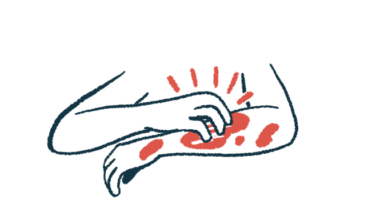Dosing Begins in Phase 2 Study of Rigosertib for Skin Cancer in RDEB

The first patient has been dosed in a Phase 2 trial investigating rigosertib as a treatment for cases of recessive dystrophic epidermolysis bullosa (RDEB) involving an aggressive skin cancer called squamous cell carcinoma (SCC).
RDEB patients are at high risk of developing SCC.
“We are pleased with the advancement of our … programs with rigosertib, and to provide rigosertib in support of this important Phase 2 investigator-sponsored study,” Steven M. Fruchtman, MD, president and CEO of Onconova Therapeutics, rigosertib’s developer, said in a press release.
The open-label (no placebo) study (NCT03786237) is evaluating rigosertib’s anti-tumor activity among RDEB patients with this cancer who have not responded to standard of care, as well as the medication’s safety and tolerability within this population.
It is currently enrolling 12 patients with locally advanced or metastatic SCC at University Hospital Salzburg, in Austria, with sites expected to open in the U.S. and U.K.; contact information is available here.
Participants will receive either oral capsules or intravenous (IV, into the vein) infusions at a doctor’s discretion. The choice will depend on an individual’s particular RDEB features, as the disorder can manifest in the skin, making IV administration difficult, or as an abnormal narrowing of the esophagus, which complicates swallowing.
Patients given oral medication will receive two 280 mg capsules in the morning and two in the afternoon (1,120 mg daily) for three weeks, followed by one week without medication, for up to a year.
Those receiving IV infusions will get 1,800 mg of rigosertib (each 24 hours) over a 72-hour period covering the first three days of eight two-week cycles. The same infusion dose will then be given over the first three days of four-week cycles, also amounting to one year of treatment.
Investigators will determine rigosertib’s anti-tumor activity by measuring the overall response rate, or the proportion of participants who achieve at least a reduction in tumor size (partial response) or an absence of any detectable tumor, meaning a complete response.
Safety and tolerability will be measured by the number and severity of side effects determined to have been caused by the treatment.
Secondary trial goals include quality-of-life assessments and biomarker analyses, taken from patient tissue samples.
The study is expected to finish in mid-2023.
Rigosertib is a small molecule that suppresses multiple cellular signaling pathways driving cancer cell growth. It blocks an enzyme called polo-like kinase 1 (PLK1), which is involved in cell division and is found at elevated levels in skin cells of people with RDEB.
A preclinical study also showed that it effectively suppressed tumor growth and selectively killed cancer cells in a mouse model of RDEB.
DEBRA International, an epidermolysis bullosa patient advocacy organization, is supporting the study alongside Onconova.
“The aggressive course and poor prognosis of skin cancer in our patients emphasize the urgent need for potent therapies,” said Johann W. Bauer, MD, the trial’s principal investigator. “We hope that rigosertib as an innovative approach provides benefit.”






